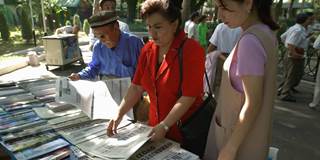In the year and a half since he took office, Uzbekistan’s president, Shavkat Mirziyoyev, has freed all the journalists that his predecessor imprisoned. But the brutal legacy of the late Islam Karimov's quarter-century in power has not been overcome, and the country's press freedoms remain on shaky ground.
NEW YORK – During his first year and a half in office, Uzbek President Shavkat Mirziyoyev has made press freedom a signature item of his reform agenda. After 27 years of censorship and iron-fisted rule by the late Islam Karimov, Uzbekistan’s news media are freer than they have ever been.
But further progress will depend on more than promises from a reform-minded president; it will require ending the legacy of harassment, intimidation, and imprisonment that has plagued the country’s journalists for decades. And, it will mean making reparations to those who suffered most, including Yusuf Ruzimuradov and Muhammad Bekjanov, two of the world’s longest-imprisoned journalists.
On March 15, 1999, Ruzimuradov and Bekjanov were arrested while working for Erk, an Uzbek-language opposition newspaper based in Kiev, Ukraine. Ruzimuradov was a reporter for the newspaper and Bekjanov was its top editor. After their arrests, they were tortured and extradited to Uzbekistan, where they were sentenced to prison on trumped-up charges of distributing a banned newspaper and planning a coup.

NEW YORK – During his first year and a half in office, Uzbek President Shavkat Mirziyoyev has made press freedom a signature item of his reform agenda. After 27 years of censorship and iron-fisted rule by the late Islam Karimov, Uzbekistan’s news media are freer than they have ever been.
But further progress will depend on more than promises from a reform-minded president; it will require ending the legacy of harassment, intimidation, and imprisonment that has plagued the country’s journalists for decades. And, it will mean making reparations to those who suffered most, including Yusuf Ruzimuradov and Muhammad Bekjanov, two of the world’s longest-imprisoned journalists.
On March 15, 1999, Ruzimuradov and Bekjanov were arrested while working for Erk, an Uzbek-language opposition newspaper based in Kiev, Ukraine. Ruzimuradov was a reporter for the newspaper and Bekjanov was its top editor. After their arrests, they were tortured and extradited to Uzbekistan, where they were sentenced to prison on trumped-up charges of distributing a banned newspaper and planning a coup.